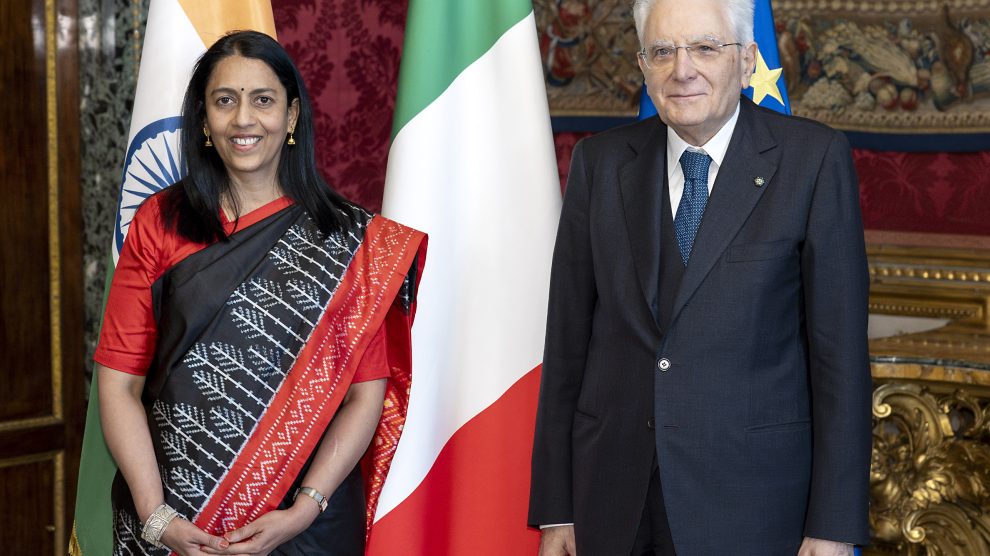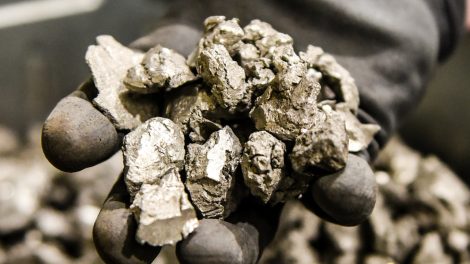For India, Italy is “a key” European partner and “a country which plays an active role in the Mediterranean and Africa,” said Vani Rao, Indian Ambassador to Italy.
Why She Matters: Vani Rao is India’s key diplomatic voice in Southern Europe. She has helped shape a new phase in India–Italy relations, positioning both countries within the wider India–EU strategic partnership and its connectivity agenda. She is India’s Permanent Representative to the Rome-based UN agencies, Food and Agriculture Organisation (FAO), World Food Programme (WFP) and International Fund for Agricultural Development (IFAD).
Q: A recent article in The National Interest described the India–Middle East–Europe Corridor (IMEC) as “still Europe’s ticket to Asia and Africa” Do you agree with that assessment? And more broadly, how is the development of what Italy’s special envoy, Amb. Francesco Maria Talò has called with Decode39 a “connectivity network” progressing?
A: IMEEC [Editor’s note: IMEEC it’s Indian acronym for IMEC] will integrate maritime, rail, and land connectivity with energy and digital infrastructure. It has an eastern corridor connecting India to the Gulf and a northern corridor connecting the Gulf to Europe. Naturally, implementing such a multifaceted initiative involves multiple stakeholders. IMEEC is gaining momentum, with member countries appointing nodal officers or special envoys.
- In its India Strategy announced in September, the EU reiterated commitment to IMEEC – through the Global Gateway and partners like EIB.
- EU-India Green Shipping Corridors will strengthen sustainable maritime connectivity and reduce dependency on carbon-intensive routes. EU-Africa-India Digital Corridor includes the Blue Raman submarine cable to connect Europe to India via the Mediterranean, the Middle East and Eastern Africa and provide high-speed and secure and data connectivity. I am happy to share that the telecom cable has landed in Mumbai.
To take forward the eastern corridor, India and UAE will facilitate a logistics and supply chain services. MAITRI or the Master Application for International Trade and Regulatory Interface, will support the India-UAE Virtual Trade Corridor. - It is heartening that in the US, IMEEC enjoys bipartisan support as a geo-economic project.
Q: Recently, India and the European Union have shown renewed activism. President von der Leyen spoke with Prime Minister Modi, the Commission and the EEAS issued a joint strategic communication, and several other initiatives have taken place. What is the common agenda, and what priorities do you see emerging in the partnership, while the leader, as PM Meloni, is pushing to step up?
A: The landmark visit to Delhi by the EU’s College of Commissioner’s led by President Ursula Von Der Leyen in February 2025 energised the India-EU Strategic Partnership. The first EU-India Strategic Dialogue in June 2025 co-chaired by High Representative & Vice-President Kaja Kallas and our Foreign Minister Dr.S.Jaishankar identified following five shared priorities or pillars for the new strategic agenda for India.
- Prosperity and Sustainability: trade, investment, supply chains, and sustainability; Negotiations for a Free Trade Agreement picked up pace. We are seeking a fair and balanced FTA while understanding each other’s sensitivities and priorities.
- Technology and Innovation: includes critical and emerging technologies, digital infrastructure, and research. A comprehensive Dialogue on Space would be held soon.
- Security and Defence: regional security, traditional and hybrid threats. India is keen to engage with the EU to establish a Security and Defence Partnership and participate in Permanent Structured Cooperation (PESCO). The EU’s strong condemnation of the terrorist attack in Pahalgam in Jammu and Kashmir in April 2025, was well received in India.
- Connectivity and global issues: cooperation in third countries and global governance, secure and sustainable digital infrastructure, including trusted 5G networks, submarine, and terrestrial cables and satellite connectivity.
- Enablers across pillars: skills mobility, research, involving business communities, and reinforcing the institutional architecture of EU-India relations.
As you can see, India-EU are discussing a wide range of issues, not just an FTA. They are seeking a long term partnership based on shared values, and one which will strengthen the supply chains, economies and defence ecosystems of both sides.
Q: Over the past months, India has shown resilience to trade initiatives from the Trump administration, managed competition with China, and maintained the ability to work with Russia and international partners from the Middle East to Southeast Asia—and, indeed, with the EU. This seems like a strategy of full multi-alignment. What role does Italy play within this framework, and how would you define the Rome–New Delhi relationship?
A: As the world’s largest democracy, fastest growing economy, boasting a large domestic market, young demographics and a vision for developed India by 2047, India is a strong partner for many major economies.
- India has always maintained good diplomatic relations with all major powers and regions, guided by its national interests and the pursuit of strategic autonomy. Engagement with South East Asia is part of our Act East strategy as we consider that region as our extended neighbourhood. The Middle East is crucial for our energy security, presence of a large number of Indian workers, and growing strategic ties with these countries.
- For India, Italy is a key European partner and a country which plays an active role in the Mediterranean and Africa. With PM Meloni at the helm, Italy has a growing voice on contemporary global issues. India’s relations with Italy have been on an upswing since 2023. We welcome Italy’s wider mediterranean strategy which extends to the Indo-Pacific in which India is a key player.
- Recent geopolitical dynamics and trade policies are impacting both countries – and have given a new impetus to our strategic partnership. Regular dialogue between our two PMs brings high-level commitment and oversight for implementing the bilateral strategic action plan 2025-2029.
- Both sides are prioritising collaboration in space, defence, trade and investments. It is heartening that several incentives to do business with India are available for Italian companies from SACE, SIMEST and other entities. If the India-EU FTA is concluded soon, it will further elevate our economic and commercial relations.





